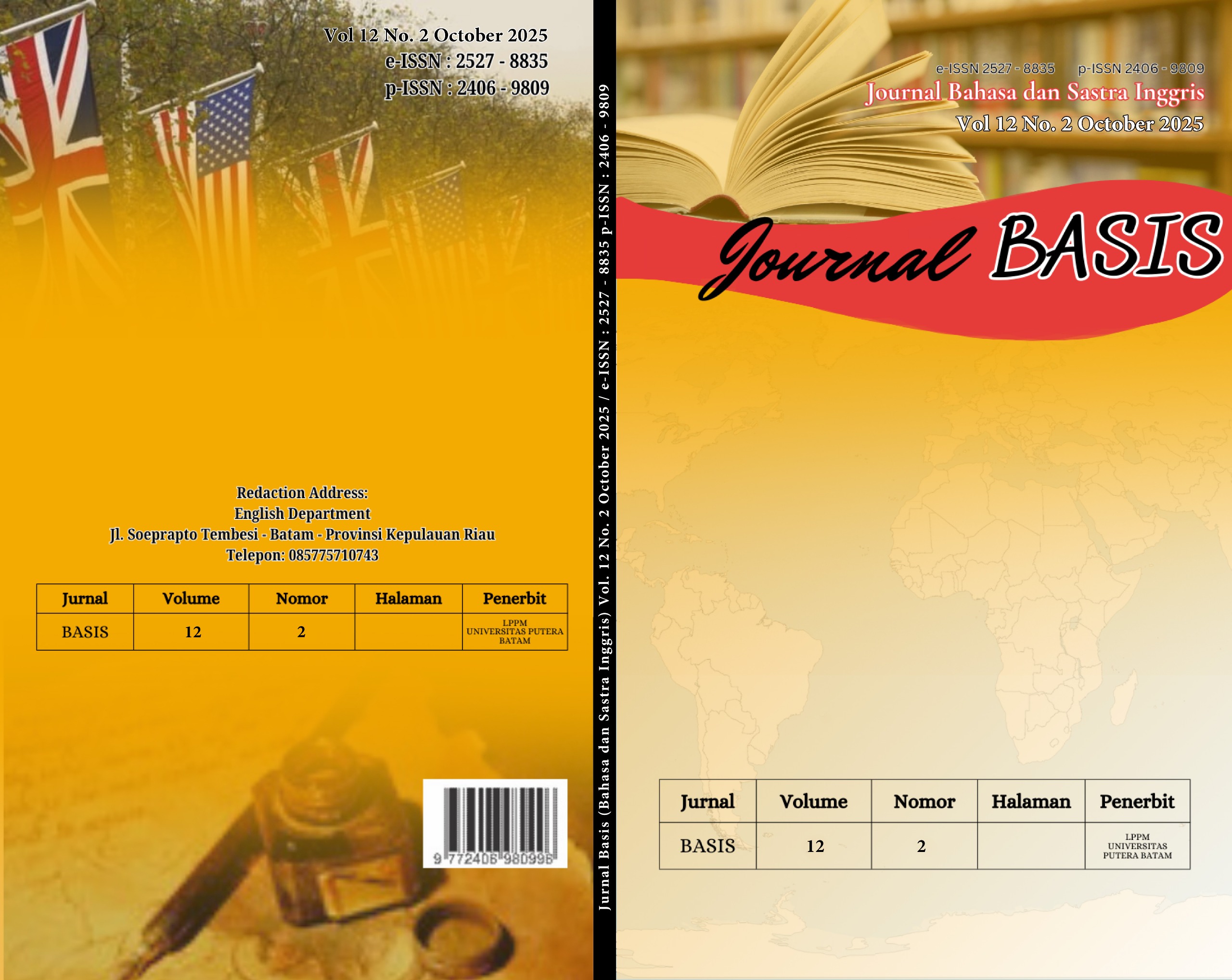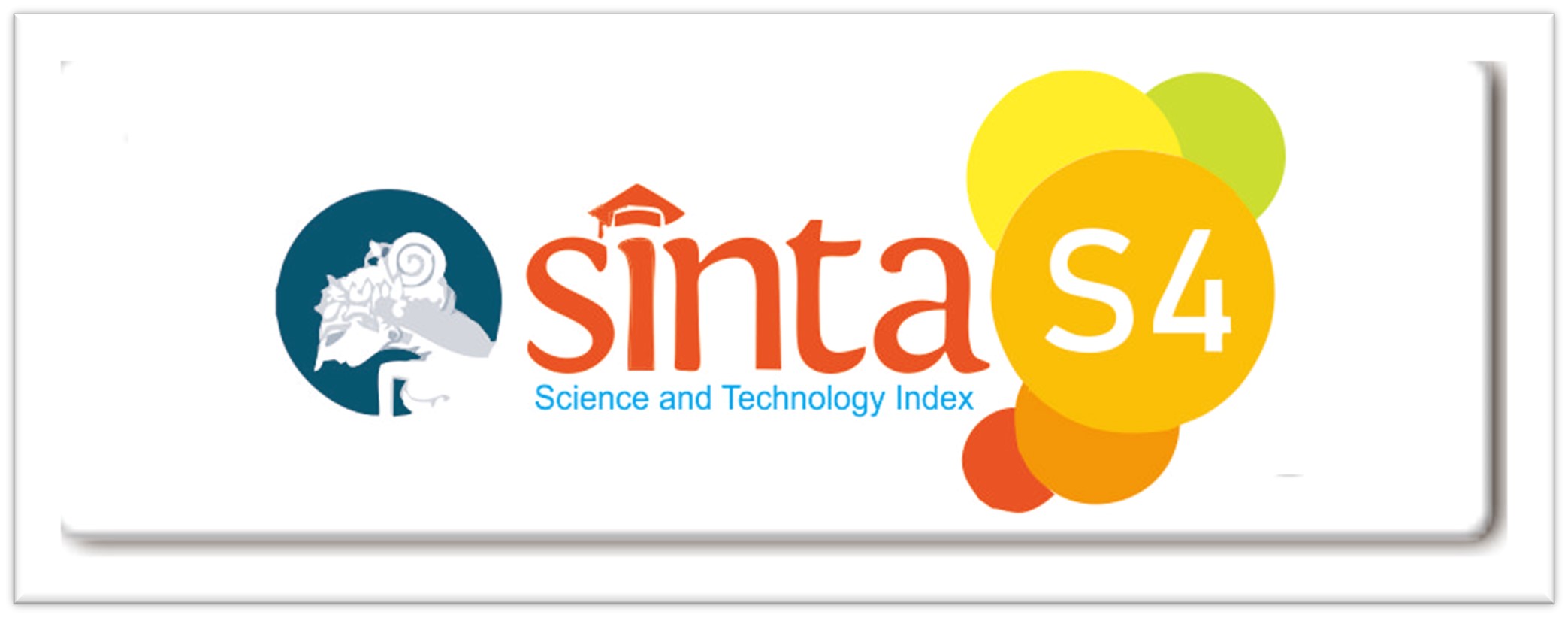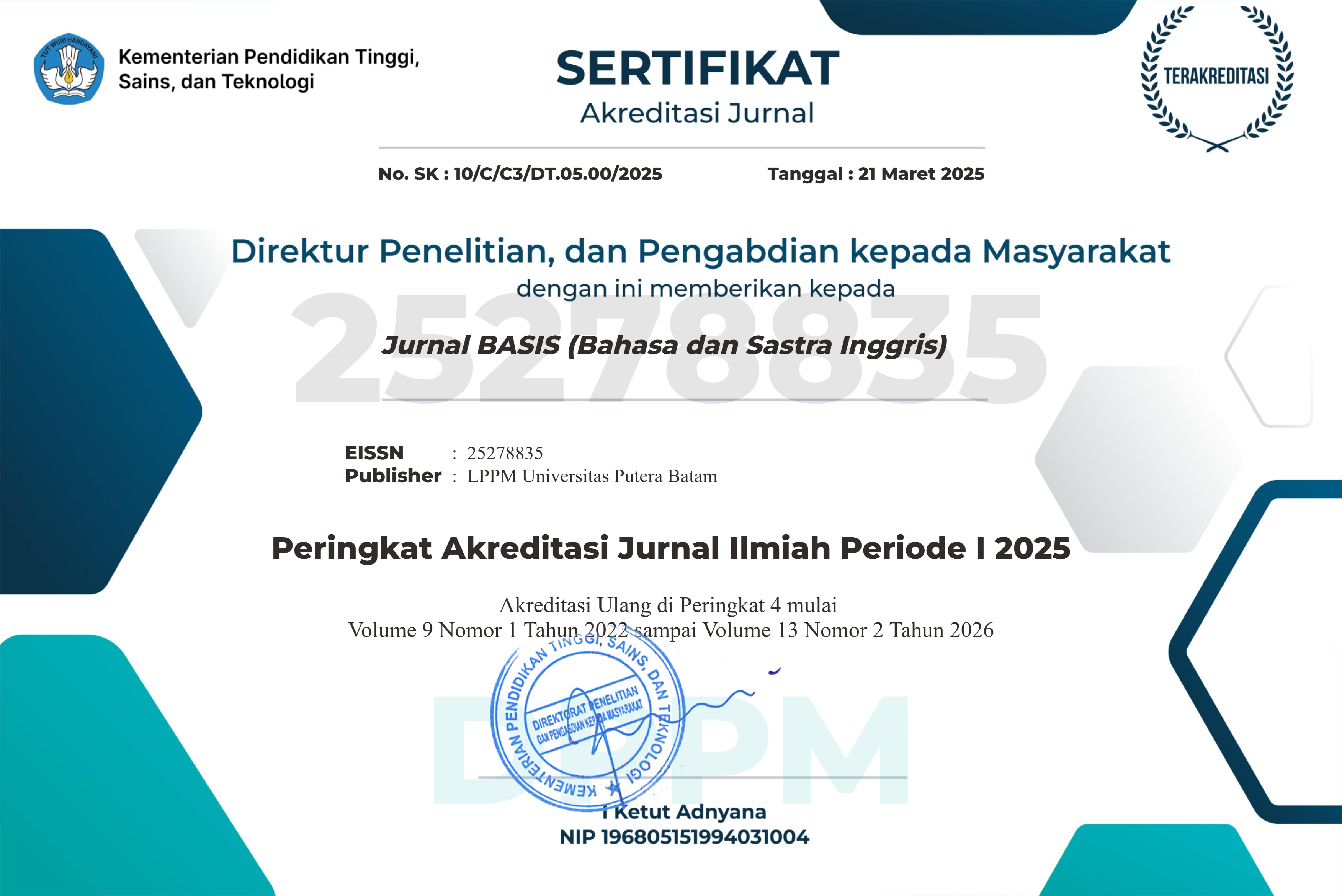TEACHER AND PEER FEEDBACK IN ACADEMIC WRITING CLASS: STUDENTS INSIGHTS FOR EFFECTIVE PRACTICE
DOI:
https://doi.org/10.33884/basisupb.v12i2.10813Keywords:
Teacher Feedback, Peer Feedback, Academic Writing ClassAbstract
Students’ writing does not always show significant improvement despite receiving feedback from the teachers in writing class. Furthermore, some challenges faced by teachers and students in the feedback process include limited time for teacher reviewing and for students reviewing the feedback, and the curriculum constraints that must be followed. Most of the previous research focused on one type of feedback and study teacher and peer feedback separately. However, this study shifts the focus toward students’ insights and preferences on both types of feedback. Specifically, it explores three areas: students’ insights into teacher feedback and peer feedback, and how students integrate and prefer both types of feedback. The population consisted of 205 second-semester students in the English Education Program enrolled in 2024 who had taken a writing subject and had experienced both teacher and peer feedback in the writing process. As sample, 64 students met the research criteria and completed the questionnaire. Data were collected through close-ended questionnaire, developed from Nicol & MacFarlane-Dick (2006) seven principles of good feedback practice. The results were analyzed using percentage. It showed that the students saw the feedback from teacher and peers can complement each other in helping them improve their performance in writing class. They believed that the teacher’s feedback as detailed, clear, and reliable while peer feedback can support active learning, collaboration, and critical reflection. Although sometimes the students had conflicting feedback between teacher and peer, they could apply the most useful feedback in revising their work.
References
Ait Taleb, A. (2024). Enhancing Students’ Trust in Peer Feedback: The Critical Role of the Preparation Phase. International Journal of Linguistics and Translation Studies, 5(4), 162–177. https://doi.org/10.36892/ijlts.v5i4.530
Cahusac de Caux, B., & Pretorius, L. (2024). Learning together through collaborative writing: The power of peer feedback and discussion in doctoral writing groups. Studies in Educational Evaluation, 83. https://doi.org/10.1016/j.stueduc.2024.101379
Collins, S., & Raita, K. (2015). Peer and Teacher Feedback in an English for Specific Purposes Writing Course: Contradictory or Complementary? https://www.researchgate.net/publication/344203715
Dea Mahara, A., & Hartono, D. (2024). The Effect of Corrective Feedback to Improve Students’ Motivation in Speaking Skills A Perspective from EFL Learners. Jayapangus Press Cetta: Jurnal Ilmu Pendidikan, 7(4). https://jayapanguspress.penerbit.org/index.php/cetta
Gan, Z., An, Z., & Liu, F. (2021). Teacher Feedback Practices, Student Feedback Motivation, and Feedback Behavior: How Are They Associated with Learning Outcomes? Frontiers in Psychology, 12. https://doi.org/10.3389/fpsyg.2021.697045
Hardianti, S., & Sabata, Y. N. (2025). The Effectiveness of The Academic Writing Course on The Writing Techniques of English Language Education Students. Qalam: Jurnal Ilmu Kependidikan, 14(1), 62–67.
Husna, L. (2018). The Implementation of “Writing in Pairs” Based on Students’ Perception. Basis: Jurnal Bahasa Dan Sastra Inggris, 5(1), 45–54.
Iftanti, E., Awalin, A. S., & Amrullah, L. (2025). Connecting Active Reading and Academic Writing in A Multicultural Context: Strategies for Syllabus and Material Packet Development. Dinamika Ilmu, 25(1), 145–164. https://doi.org/10.21093/di.v25i1.10185
Isroyani, L., Mukti, S. R. W., Muti’ain, M., & Jaelani, S. R. (2023). Understanding Impact Feedback on English Writing Ability Among High School Students. Pendekar: Jurnal Pendidikan Berkarakter, 1(4), 245–254. https://doi.org/10.51903/pendekar.v1i4.336
Jamalinesari, A., Rahimi, F., Gowhary, H., & Azizifar, A. (2015). The Effects of Teacher-Written Direct vs. Indirect Feedback on Students’ Writing. Procedia - Social and Behavioral Sciences, 192, 116–123. https://doi.org/10.1016/j.sbspro.2015.06.018
Jongsma, M. V., Scholten, D. J., Houtkamp, J., Meeter, M., & van Muijlwijk-Koezen, J. E. (2024). Enhancing Trust, Safety and Quality: Exploring the Role of Dialogue in Peer Feedback on Professional Competencies. Cogent Education, 11(1). https://doi.org/10.1080/2331186X.2024.2349355
Martin, I. A., & Sippel, L. (2024). Providing vs. receiving peer feedback: Learners’ beliefs and experiences. Language Teaching Research, 28(3), 1033–1054. https://doi.org/10.1177/13621688211024365
Mayasari, E., & Iswanto, J. (2025). The Challenges of Writing: English Education Students at STAI Miftahul Ulum Tanjungpinang. Sintaksis: Publikasi Para Ahli Bahasa Dan Sastra Inggris, 3(1), 232–241. https://doi.org/10.61132/sintaksis.v3i1.1405
Min, H. T. (2006). The effects of trained peer review on EFL students’ revision types and writing quality. Journal of Second Language Writing, 15(2), 118–141. https://doi.org/10.1016/j.jslw.2006.01.003
Nash, R. A., & Winstone, N. E. (2017). Responsibility-sharing in the giving and receiving assessment feedback. Frontiers in Psychology, 8(SEP). https://doi.org/10.3389/fpsyg.2017.01519
Nazmillah, N., Hidayat, D. N., Defianty, M., Anita, A., & Muin, A. (2022). A Study of Teachers’ Strategies in Providing Feedback in English Writing Class. Acitya: Journal of Teaching and Education, 4(2), 339–356. https://doi.org/10.30650/ajte.v4i2.3258
Nicol, D., & MacFarlane-Dick, D. (2006). Formative assessment and self-regulated learning: A model and seven principles of good feedback practice. Studies in Higher Education, 31(2), 199–218. https://doi.org/10.1080/03075070600572090
Nurkhamidah, N., Lustyantie, N., & Chaeruman, U. A. (2024). Peer Feedback in Academic Writing: Students’ Perspectives on Learning and Improvement. Jo-ELT (Journal of English Language Teaching) Fakultas Pendidikan Bahasa & Seni Prodi Pendidikan Bahasa Inggris IKIP, 11(2), 233. https://doi.org/10.33394/jo-elt.v11i2.13330
Putera, Z. F., & Shofiah, N. (2023). Persepsi Mahasiswa Terhadap Umpan Balik Dosen Pembimbing pada Penyusunan Laporan Skripsi. Metalingual: Jurnal Pendidikan Bahasa Dan Sastra Indonesia, 8(2), 86–94.
Putu, N., Putri, D. A., Ketut Wardana, I., Ayu, D., Joni, A. W., & Denpasar, U. M. (2024). The Significance of Teacher Correction on Student Confidence and Writing Achievement. Jurnal Santiaji Pendidikan (JSP), 14(1).
Seker, M., & Dincer, A. (2014). An insight to students’ perceptions on teacher feedback in second language writing classes. English Language Teaching, 7(2), 73–83. https://doi.org/10.5539/elt.v7n2p73
Syahrianti, S., Gaffar, S., Nur, S., & Daniel, M. C. (2023). Exploring Teacher’s Feedback on Students’ Writing Skill in Indonesian EFL Classroom. Lingua Didaktika: Jurnal Bahasa Dan Pembelajaran Bahasa, 17(1), 47. https://doi.org/10.24036/ld.v17i1.121092
Thirakunkovit, S., & Chamcharatsri, B. (2019). A Meta-analysis of Effectiveness of Teacher and Peer Feedback: Implications for Writing Instructions and Research. Article in Asian EFL Journal, 1(21), 140–170. https://www.researchgate.net/publication/331179141
Tianotak, U. S. (2021). The Challenges of Peer Feedback in EFL Writing Classroom: Viewed from Students’ Perspectives. English Department of UMMU Journal (EDU Journal), 1(2). http://www.jurnal.ummu.ac.id/index.php/edu
Ulfira, N., Jamaliah, J., & Farizawati, F. (2024). Student’s Perceptions on Teacher Feedback in Writing Class. The Journal of English Education, 01(1). http://journal.unigha.ac.id/index.php/JUREE.2024http://journal.unigha.ac.id/index.php/JUREE2024journal.unigha.ac.id.Allrightreserved
Wahyuni, S. (2017). The Effect of Different Feedback on Writing Quality of College Students with Different Cognitive Styles. Dinamika Ilmu, 39–58. https://doi.org/10.21093/di.v17i1.649
Williams, A. (2024). Delivering Effective Student Feedback in Higher Education: An Evaluation of the Challenges and Best Practice. International Journal of Research in Education and Science, 10(2), 473–501. https://doi.org/10.46328/ijres.3404
Wu, Y., & Schunn, C. D. (2021). The Effects of Providing and Receiving Peer Feedback on Writing Performance and Learning of Secondary School Students. American Educational Research Journal, 58(3), 492–526. https://doi.org/10.3102/0002831220945266
Xiaomeng, Z., & Ravindran, L. (2024). The Effects of Peer Feedback Provision and Reception on Lower-proficiency EFL Learners’ Writing Development. Studies in Educational Evaluation, 83. https://doi.org/10.1016/j.stueduc.2024.101422
Zaccaron, R., & Xhafaj, D. C. P. (2024). Teacher and Peer Feedback on English as an Additional Language Writing: The Role of Social Representations. Profile: Issues in Teachers’ Professional Development, 26(1), 49–64. https://doi.org/10.15446/profile.v26n1.107196
Zahari, M., Marini, A., Safitri, D., Dewiyani, L., & Muawanah, U. (2025). Optimizing student writing performance in higher education: A quantitative study of teacher feedback and classroom environment. Social Sciences and Humanities Open, 11. https://doi.org/10.1016/j.ssaho.2025.101286













 JURNAL BASIS (BAHASA DAN SASTRA INGGRIS)
JURNAL BASIS (BAHASA DAN SASTRA INGGRIS)
